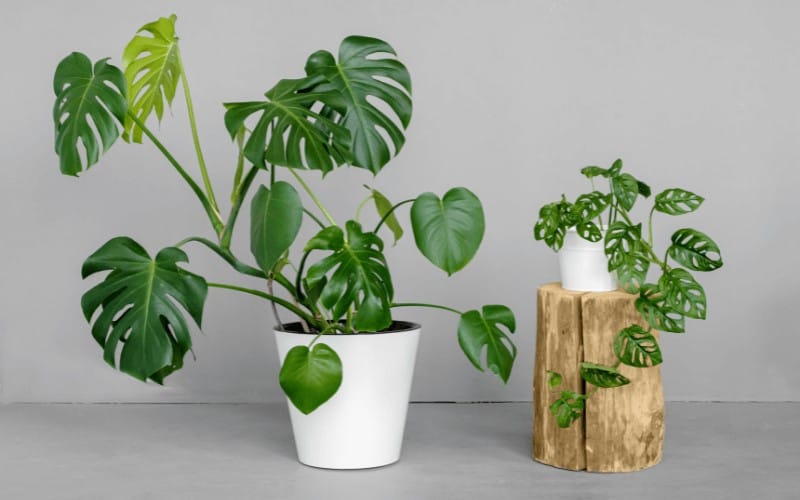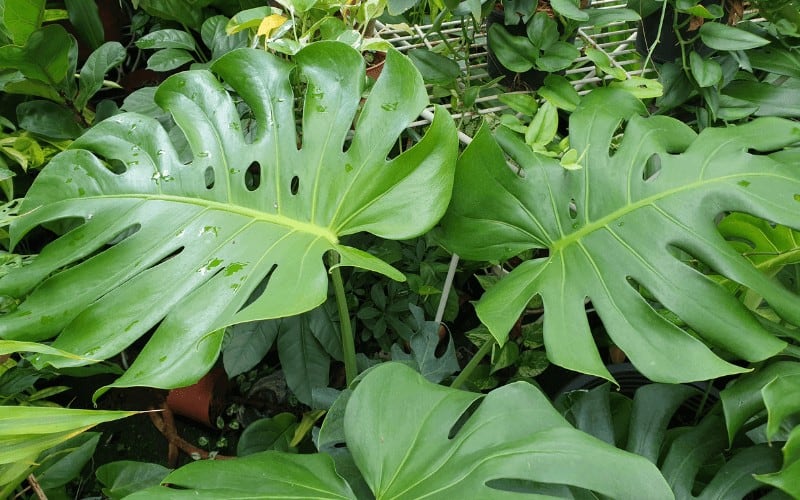Monsteras are native to Central America and are species of evergreen tropical vines and shrubs known for their natural leaf holes. The plants are also nicknamed Swiss Cheese Plant probably as a result of its leaf-holes.
Monstera is increasingly used as a houseplant, although it was used to beautify backyard gardens before now. To ensure healthy monstera plant, you need to understand the humidity requirement of the plant. But does monstera like humidity?
First of all, you will have to consider the fact that the Monstera plant coming from a warm and humid forest condition means that the plant will thrive in a warm and humid environment.
This post will cover all you need to know about caring for these beautiful plants.
Table of Contents
Does Monstera Like Humidity?

Monstera plants will probably not survive in low humidity. Tracing the origin of monstera plants, you will realize that the plant comes from a warm and humid forest condition; that follows that a warm and humid environment must be provided for the plant to flourish.
When monstera are grown as houseplants, we realize that the tropical plant, among other needs, requires adequate humidity in its transpiration and photosynthesis processes.
How Does Humidity Affects Monstera Plant?
Low humidity can adversely affect monstera plants. If your monstera plant is suffering from low humidity levels, you will notice the following:
1. Crisp and Brittle Leaves: Monsteras are naturally water-loving plants with thick, green foliage. If suddenly, the leaves become brittle or crisp and easy to break, it simply indicates a sign of water shortage.
2. Brown discoloration: if you notice brown edges or tips on monstera leaves, it simply points to low humidity levels.
Other symptoms that your monstera plant is suffering from low humidity levels include:
- Yellowing of new leaves
- Droopy and curling of leaves
- Your monstera will start wilting
How Much Humidity Does Monstera Need?
Ideally, monstera thrives with a humidity level of 60% and above. But, if you are growing the plant as an indoor one, that might be an unrealistic expectation.
Monsteras are fairly tolerable and adaptive plants and can survive with an average humidity of 40-50%.
How To Provide Ideal Humid Environment for Monstera

Most gardeners struggle with providing the ideal environment for their monstera plant to grow and thrive.
This post will highlight practicable ways of providing the perfect environment for your monstera plants.
1. The Greenhouse Method
Greenhouses protect plants from excessive heat and cold, which might be precisely what your monstera plant needs.
Mini greenhouses will add to the décor in your home and at the same time help your monstera plant retain moisture.
When buying an indoor greenhouse, take into consideration the size of your monstera plant.
2. The Aquarium Method
Aquariums are known to increase the humidity level of the room.
Just like an indoor greenhouse, they can give your home décor a boost and at the same time evaporates water which naturally raises the humidity of the room.
3. Group Your Plants Together
Grouping your houseplants with common humidity requirements has been a common practice that helps to raise the humidity.
When grouping the plants together, be sure to combine your monstera with other houseplants that require high humidity.
4. Use Gravel Trays
You can place your monstera pot on gravels or pebble filled with water. Place some pebbles or gravels on a flat, clean tray, and fill it with water before placing the pot above. This method has been shown to increase the humidity level.
5. Use Humidifier
Humidifiers are great ways to raise the humidity of your room and are quite effective in raising and maintaining humidity levels.
Place the Humidifier about four to five feet away from your monstera to thrive.
6. Misting
There are opposing views on using misting as a method to raise humidity levels in plants. Misting involves spraying your plants with tiny droplets of water to raise the humidity level.
Misting is not recommended in high humid regions as it could result in excessive moisture in your plant leaves, leading to pathogenic infections.
Even in low humid regions, using the misting method requires you to mist your monstera frequently to achieve the required humidity level, which can be a bit tedious.
It's best to use other methods like grouping the plants together or using a humidifier to raise humidity.
Conclusion
In conclusion, monstera definitely loves to stay in a humid environment. This answers the question, does monstera like humidity?
Monsteras have high tolerable rates, which means they can survive even when the temperature and humidity levels are not ideal.
However, to ensure your monstera plant thrives beautifully, we recommend you adopt the specifications provided in this post, especially if you live in dry, arid areas.




